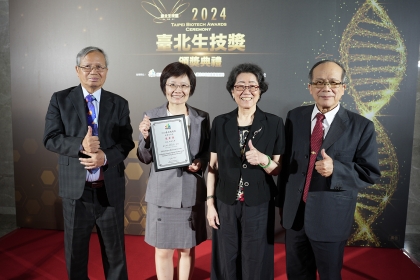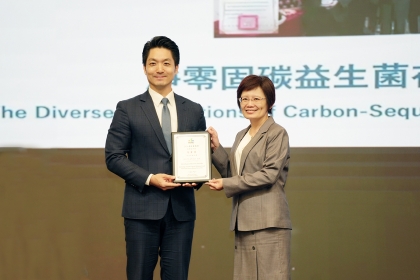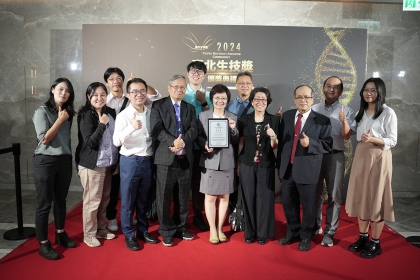NCHU Team Develops Net-Zero Carbon Sequestration Probiotics Wins Taipei Biotech Award for Technology Transfer Collaboration
2024-09-30
興新聞張貼者
Unit秘書室
1,871
Dubbed the "Oscars of Biotechnology," the Taipei Biotech Awards held their award ceremony on September 24. A team led by Professor Tzu-Pi Huang, Director of the Academy of Circular Economy and professor of the Department of Plant Pathology, National Chung Hsing University (NCHU), won the Excellence Award in the Technology Transfer Collaboration category for their work on “Diverse Applications of Net-Zero Carbon Fixing Probiotics in Agricultural Green Circularity.” This was the only award-winning team in the field of agricultural biotechnology.
The technology has been licensed to Daimond Quantum Biotechnology Co., Ltd., and President Biotechnology International Investment Co., Ltd., for mass production and distribution. The products derived from this technology are widely applied to crops such as citrus, melons, passion fruit, tea, and rice, helping them withstand extreme climates and enhancing soil carbon sequestration.
The research team includes Professor Tzu-Pi Huang, Distinguished Professor Jenn-Wen Huang, Dr. Yu-Hsuan Chen from NCHU’s Department of Plant Pathology, along with Deputy Director Chuan-Shun Lin from the Animal Technology Research Center, Dr. Chung-Lun Lu from the Aquatic Technology Research Center, Associate Researcher Chien-Ya Kao, and Researcher Wen-Di Huang from the Plant Technology Research Center, all from the Agricultural Technology Research Institute.
The team brought together expertise from various fields including plant health, livestock and aquatic farming, and circular agriculture. They developed Bacillus based probiotics, isolated from Taiwan and internationally recognized as safe for human and animal consumption, which have multiple applications. The Bacillus probiotic products they developed produce various digestive enzymes and antimicrobial lipopeptides, and form biofilms on plant roots, thereby promoting the growth of crops such as strawberries, cucumbers, cabbages, tomatoes, passion fruits, and tea. These probiotics help combat diseases, drought, and flooding that challenge crop production, reduce the use of chemical pesticides and fertilizers, and enhance both crop yields and the plants’ ability to sequester carbon.
Professor Tzu-Pi Huang noted that when added to the feeds of hogs, chickens, fish, and shrimp, these probiotics not only accelerate growth and improve meat quality but also enhance the immunity of piglets, alleviate chicken enteritis, and reduce unpleasant odors in farming environments. In fish and shrimp farming, the probiotics effectively suppress the presence of Vibrio pathogens in the intestines, reduce disease incidence, lower organic matter, ammonia-nitrogen levels, and Vibrio counts in the water, improve water quality, and enrich algae-based feed in aquaculture environments.
This Bacillus preparation offers broad industrial applicability and can serve as a solution for maintaining agricultural green circularity and achieving net-zero emissions in agriculture. Since April 2022, the team’s technology transfer partners have collaborated with rice farmers in Yuli, Hualien, as part of the "Carbon Farming Project for Taiwan's Small Farmers," supported by the Green Consumers' Foundation. The project applied for certification with Gold Standard. After more than a year of monitoring, the team found that rice paddies treated with the Bacillus probiotic fertilizers showed significant soil carbon sequestration. In one hectare of trial fields, carbon fixation reached an impressive rate of 0.4% annually, equivalent to 66 tons of carbon dioxide.
The technology has been licensed to Daimond Quantum Biotechnology Co., Ltd., and President Biotechnology International Investment Co., Ltd., for mass production and distribution. The products derived from this technology are widely applied to crops such as citrus, melons, passion fruit, tea, and rice, helping them withstand extreme climates and enhancing soil carbon sequestration.
The research team includes Professor Tzu-Pi Huang, Distinguished Professor Jenn-Wen Huang, Dr. Yu-Hsuan Chen from NCHU’s Department of Plant Pathology, along with Deputy Director Chuan-Shun Lin from the Animal Technology Research Center, Dr. Chung-Lun Lu from the Aquatic Technology Research Center, Associate Researcher Chien-Ya Kao, and Researcher Wen-Di Huang from the Plant Technology Research Center, all from the Agricultural Technology Research Institute.
The team brought together expertise from various fields including plant health, livestock and aquatic farming, and circular agriculture. They developed Bacillus based probiotics, isolated from Taiwan and internationally recognized as safe for human and animal consumption, which have multiple applications. The Bacillus probiotic products they developed produce various digestive enzymes and antimicrobial lipopeptides, and form biofilms on plant roots, thereby promoting the growth of crops such as strawberries, cucumbers, cabbages, tomatoes, passion fruits, and tea. These probiotics help combat diseases, drought, and flooding that challenge crop production, reduce the use of chemical pesticides and fertilizers, and enhance both crop yields and the plants’ ability to sequester carbon.
Professor Tzu-Pi Huang noted that when added to the feeds of hogs, chickens, fish, and shrimp, these probiotics not only accelerate growth and improve meat quality but also enhance the immunity of piglets, alleviate chicken enteritis, and reduce unpleasant odors in farming environments. In fish and shrimp farming, the probiotics effectively suppress the presence of Vibrio pathogens in the intestines, reduce disease incidence, lower organic matter, ammonia-nitrogen levels, and Vibrio counts in the water, improve water quality, and enrich algae-based feed in aquaculture environments.
This Bacillus preparation offers broad industrial applicability and can serve as a solution for maintaining agricultural green circularity and achieving net-zero emissions in agriculture. Since April 2022, the team’s technology transfer partners have collaborated with rice farmers in Yuli, Hualien, as part of the "Carbon Farming Project for Taiwan's Small Farmers," supported by the Green Consumers' Foundation. The project applied for certification with Gold Standard. After more than a year of monitoring, the team found that rice paddies treated with the Bacillus probiotic fertilizers showed significant soil carbon sequestration. In one hectare of trial fields, carbon fixation reached an impressive rate of 0.4% annually, equivalent to 66 tons of carbon dioxide.




